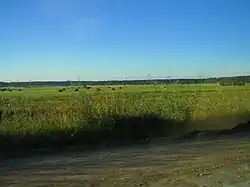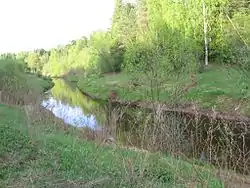Kirishsky District
Киришский район | |
|---|---|
 Farm field in Kirishsky District | |
.png.webp) Flag  Coat of arms | |
Location of Kirishsky District in Leningrad Oblast | |
| Coordinates: 59°27′19″N 32°02′11″E / 59.45528°N 32.03639°E | |
| Country | Russia |
| Federal subject | Leningrad Oblast[1] |
| Established | 1 August 1927 |
| Administrative center | Kirishi[1] |
| Area | |
| • Total | 3,019.3 km2 (1,165.8 sq mi) |
| Population | |
| • Total | 11,455 |
| • Estimate (2018)[4] | 62,456 (+445.2%) |
| • Density | 3.8/km2 (9.8/sq mi) |
| • Urban | 33.8% |
| • Rural | 66.2% |
| Administrative structure | |
| • Administrative divisions | 4 settlement municipal formation |
| • Inhabited localities[1] | 1 cities/towns, 1 Urban-type settlements[5], 75 rural localities |
| Municipal structure | |
| • Municipally incorporated as | Kirishsky Municipal District[6] |
| • Municipal divisions[6] | 2 urban settlements, 4 rural settlements |
| Time zone | UTC+3 (MSK |
| OKTMO ID | 41624000 |
| Website | http://www.admkir.ru/ |
Kirishsky District (Russian: Ки́ришский райо́н) is an administrative[1] and municipal[6] district (raion), one of the seventeen in Leningrad Oblast, Russia. It is located in the central southern part of the oblast and borders with Volkhovsky District in the north, Tikhvinsky District in the northeast, Lyubytinsky District of Novgorod Oblast in the southeast, Malovishersky District of Novgorod Oblast in the south, Chudovsky District of Novgorod Oblast in the southwest, Tosnensky District in the west, and Kirovsky District in the northwest. The area of the district is 3,019.3 square kilometers (1,165.8 sq mi).[2] Its administrative center is the town of Kirishi.[1] Population (excluding the administrative center): 11,455 (2010 Census);[3] 12,075 (2002 Census);[8] 14,521 (1989 Census).[9]
Geography

Kirishsky District is elongated from northwest to southeast, and almost the whole area of the district belongs to the drainage basin of the Volkhov River. The Volkhov crosses the district from south to north, with its biggest tributaries within the district being the Pchyovzha River (right) and the Tigoda River (left). Minor areas in the east of the district belong to the basin of the Syas River. The forests occupy two thirds of the area of the district, with swamps occupying further 13%. By far the most common tree is spruce.[2]
History
The Volkhov River in the medieval times served as a part of the trade route from the Varangians to the Greeks. The area was a part of Novgorod Lands, subsequently of the Novgorod Republic. After the fall of the republic, it was, together will all Novgorod Lands, annexed by the Grand Duchy of Moscow. The area was included into Obozerskaya Pyatina, one of the pyatinas which Novgorod Lands were divided into. Kirishi was first mentioned in chronicles in 1693.[10]
In the course of the administrative reform carried out in 1708 by Peter the Great, the area was included into Ingermanland Governorate (known since 1710 as Saint Petersburg Governorate) as Ladozhsky Uyezd with the center in Staraya Ladoga. In 1727, separate Novgorod Governorate was split off, and the uyezd was transformed into Novoladozhsky Uyezd, and the administrative center was moved to Novaya Ladoga. In 1776, the area was transferred to Novgorod Viceroyalty, and in 1781, it was moved back into Saint Petersburg Governorate. On December 9, 1922, the administrative center of the uyezd was moved to the selo of Gostinopolye, which was renamed Volkhov and was granted town status. The uyezd was renamed Volkhovsky. In 1924 the changes were rolled back, the administrative center moved to Novaya Ladoga, and Volkhov was demoted to a selo (eventually renamed Gostinopolye). The name of the uyezd remained Volkhovsky.[11] Saint Petersburg Governorate was twice renamed, to Petrograd Governorate and subsequently to Leningrad Governorate.
On August 1, 1927, the uyezds were abolished and Andreyevsky District, with the administrative center in the selo of Andreyevo, was established. The governorates were also abolished, and the district was a part of Leningrad Okrug of Leningrad Oblast. It included parts of former Volkhovsky Uyezd. On July 23, 1930, the okrugs were abolished as well, and the districts were directly subordinated to the oblast. On September 30, 1931, the administrative center of the district was moved to the selo of Kirishi, which was formerly known as Soltsy, and the district was renamed Kirishsky. On December 27, 1933, Kirishi was granted urban-type settlement status. Between October 1941 and January 1944, during World War II, the district were occupied by German troops. Kirishi, which was occupied for two years, was greatly damaged, and in February 1944 the administrative center of the district was moved to the urban-type settlement of Budogoshch. On February 1, 1963, the district was abolished and merged into Volkhovsky District, and on January 12, 1965, it was re-established. Kirishi was granted town status and made the administrative center of the district. On January 26, 1967, Kirishi was made a town of oblast significance.[12] In 2010, the administrative division of Leningrad Oblast was harmonized with the municipal division, and Kirishi was made a town of district significance.[13]
On August 1, 1927, Budogoshchensky District with the administrative center in the urban-type settlement of Budogoshch was established as well as part of Leningrad Okrug of Leningrad Oblast. On January 1, 1932, Budogoshchensky District was abolished and split between Dregelsky and Kirishsky Districts.[14]
Economy
Industry
There are several oil refineries and chemical industry enterprises, all located in the town of Kirishi. The biggest of them is Kinef. As of 2012, industry was responsible for the 88% GDP produced in the district.[15] Kirishi Power Station, a thermal power station, is located in the town of Kirishi as well.
Agriculture
Agricultural lands occupy 17% of the district and are located in the valleys of the Volkhov, the Pchyovzha, and the Sharya, a tributary of the Oskuya.[2] The main agricultural specializations in the district are milk and vegetables production.[15]
Transportation
The railroad connecting Sonkovo and Mga crosses the district. The principal railway stations are Kirishi and Budogoshch. In Kirishi, another railway branches off north. It connects Kirishi with Tikhvin, which lies on the line connecting St. Petersburg and Vologda via Cherepovets.
Kirishi is connected by road with Volkhov and Chudovo. There are also local roads.
The Volkhov River is navigable within the district, however, there is no passenger navigation.
Culture and recreation
The district contains thirty-two objects classified as cultural and historical heritage of local significance.[16] Most of them commemorate the events of World War II.
The only museum in the district is the Kirishsky District Museum, located in Kirishi.[17]
References
Notes
- 1 2 3 4 5 Oblast Law #32-oz
- 1 2 3 4 Географические данные (in Russian). Киришский муниципальный район. Archived from the original on April 18, 2012. Retrieved December 25, 2012.
- 1 2 Russian Federal State Statistics Service (2011). Всероссийская перепись населения 2010 года. Том 1 [2010 All-Russian Population Census, vol. 1]. Всероссийская перепись населения 2010 года [2010 All-Russia Population Census] (in Russian). Federal State Statistics Service.
- ↑ "26. Численность постоянного населения Российской Федерации по муниципальным образованиям на 1 января 2018 года". Federal State Statistics Service. Retrieved January 23, 2019.
- ↑ The count of urban-type settlements may include the work settlements, the resort settlements, the suburban (dacha) settlements, as well as urban-type settlements proper.
- 1 2 3 Law #49-oz
- ↑ "Об исчислении времени". Официальный интернет-портал правовой информации (in Russian). June 3, 2011. Retrieved January 19, 2019.
- ↑ Russian Federal State Statistics Service (May 21, 2004). Численность населения России, субъектов Российской Федерации в составе федеральных округов, районов, городских поселений, сельских населённых пунктов – районных центров и сельских населённых пунктов с населением 3 тысячи и более человек [Population of Russia, Its Federal Districts, Federal Subjects, Districts, Urban Localities, Rural Localities—Administrative Centers, and Rural Localities with Population of Over 3,000] (XLS). Всероссийская перепись населения 2002 года [All-Russia Population Census of 2002] (in Russian).
- ↑ Всесоюзная перепись населения 1989 г. Численность наличного населения союзных и автономных республик, автономных областей и округов, краёв, областей, районов, городских поселений и сёл-райцентров [All Union Population Census of 1989: Present Population of Union and Autonomous Republics, Autonomous Oblasts and Okrugs, Krais, Oblasts, Districts, Urban Settlements, and Villages Serving as District Administrative Centers]. Всесоюзная перепись населения 1989 года [All-Union Population Census of 1989] (in Russian). Институт демографии Национального исследовательского университета: Высшая школа экономики [Institute of Demography at the National Research University: Higher School of Economics]. 1989 – via Demoscope Weekly.
- ↑ Историческая справка (in Russian). Киришский муниципальный район. Archived from the original on March 6, 2014. Retrieved December 27, 2012.
- ↑ Новоладожский уезд (1917 - фев. 1923 г.), Волховский уезд ( фев. 1923 - авг.1927 г.) (in Russian). Система классификаторов исполнительных органов государственной власти Санкт-Петербурга. Archived from the original on February 22, 2014. Retrieved December 14, 2012.
- ↑ Андреевский район (авг. 1927 – сент. 1931), Киришский район (сент. 1931 – февр. 1963, янв. 1965) (in Russian). Система классификаторов исполнительных органов государственной власти Санкт-Петербурга. Archived from the original on June 13, 2013. Retrieved December 14, 2012.
- ↑ Отчет о работе комитета по взаимодействию с органами местного самоуправления Ленинградской области в 2010 году (in Russian). Комитет по печати и связям с общественностью Ленинградской области. Retrieved November 16, 2012.
- ↑ Будогощенский район (авг. 1927 – янв. 1932) (in Russian). Система классификаторов исполнительных органов государственной власти Санкт-Петербурга. Archived from the original on June 13, 2013. Retrieved December 27, 2012.
- 1 2 Экономика (in Russian). Киришский муниципальный район. Archived from the original on August 6, 2013. Retrieved December 26, 2012.
- ↑ Памятники истории и культуры народов Российской Федерации (in Russian). Russian Ministry of Culture. Retrieved June 2, 2016.
- ↑ Киришский историко-краеведческий музей (in Russian). Российская сеть культурного наследия. Archived from the original on March 24, 2013. Retrieved December 26, 2012.
Sources
- Законодательное собрание Ленинградской области. Областной закон №32-оз от 15 июня 2010 г. «Об административно-территориальном устройстве Ленинградской области и порядке его изменения», в ред. Областного закона №23-оз от 8 мая 2014 г. «Об объединении муниципальных образований "Приморское городское поселение" Выборгского района Ленинградской области и "Глебычевское сельское поселение" Выборгского района Ленинградской области и о внесении изменений в отдельные Областные законы». Вступил в силу со дня официального опубликования. Опубликован: "Вести", №112, 23 июня 2010 г. (Legislative Assembly of Leningrad Oblast. Oblast Law #32-oz of June 15, 2010 On the Administrative-Territorial Structure of Leningrad Oblast and on the Procedures for Its Change, as amended by the Oblast Law #23-oz of May 8, 2014 On Merging the Municipal Formations of "Primorskoye Urban Settlement" in Vyborgsky District of Leningrad Oblast and "Glebychevskoye Rural Settlement" in Vyborgsky District of Leningrad Oblast and on Amending Various Oblast Laws. Effective as of the day of the official publication.).
- Законодательное собрание Ленинградской области. Областной закон №49-оз от 1 сентября 2004 г. «Об установлении границ и наделении соответствующим статусом муниципального образования Киришский муниципальный район и муниципальных образований в его составе», в ред. Областного закона №17-оз от 6 мая 2010 г «О внесении изменений в некоторые областные законы в связи с принятием федерального закона "О внесении изменений в отдельные законодательные акты Российской Федерации в связи с совершенствованием организации местного самоуправления"». Вступил в силу через 10 дней со дня официального опубликования (24 сентября 2004 г.). Опубликован: "Вестник Правительства Ленинградской области", №27, 14 сентября 2004 г. (Legislative Assembly of Leningrad Oblast. Oblast Law #49-oz of September 1, 2004 On Establishing the Borders of and Granting an Appropriate Status to the Municipal Formation of Kirishsky Municipal District and to the Municipal Formations It Comprises, as amended by the Oblast Law #17-oz of May 6, 2010 On Amending Various Oblast Laws Due to the Adoption of the Federal Law "On Amending Various Legislative Acts of the Russian Federation Due to the Improvement of the Organization of the Local Self-Government". Effective as of after 10 days from the day of the official publication (September 24, 2004).).